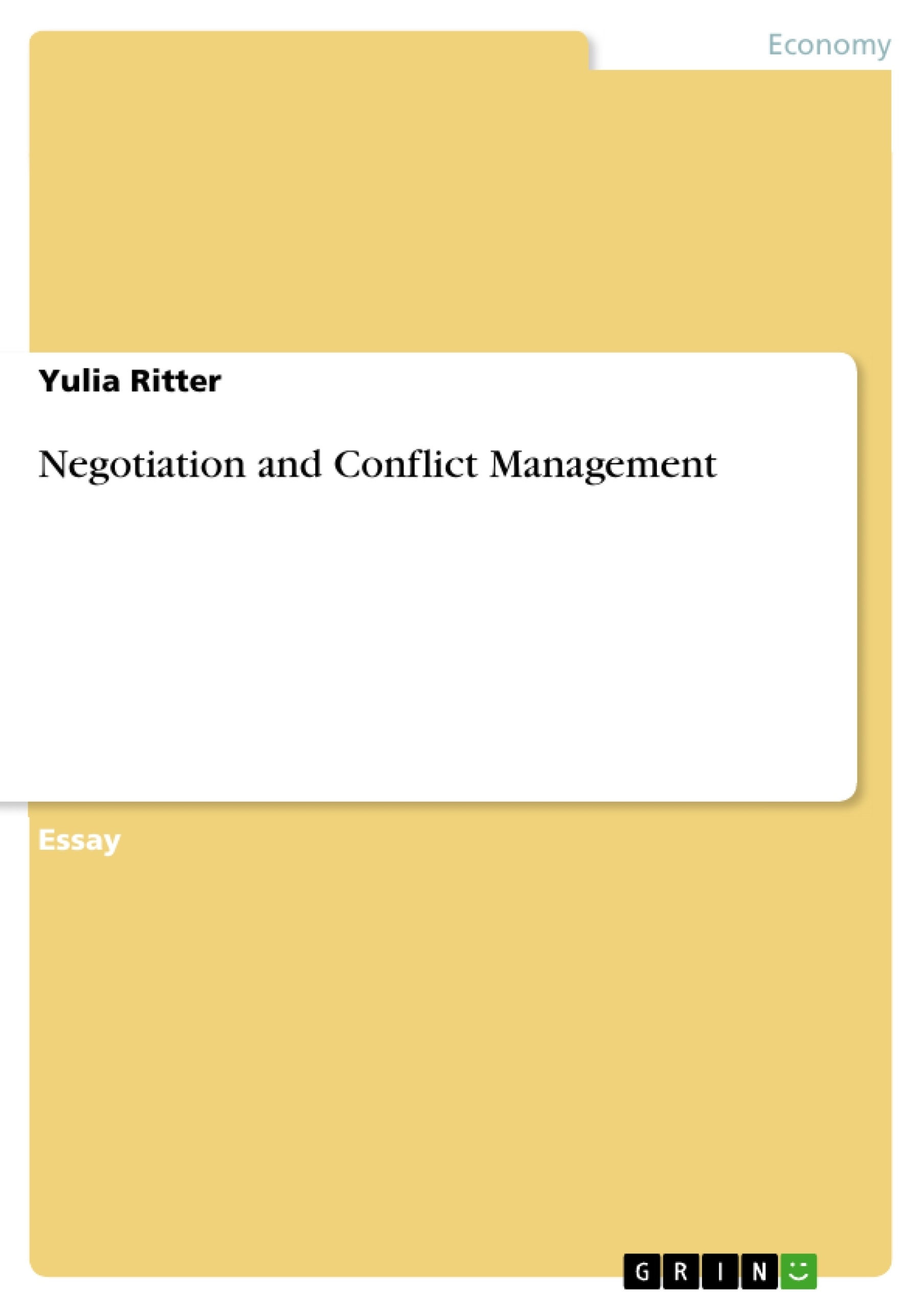Business negotiations are increasingly acknowledged as a significant area of management processes relevant to the implementation of business strategies. In the rapidly changing environment of knowledge-based competition, organisations only succeed by virtue of effective negotiations and establishing long-term relationships among multiple parties involved in various business processes. The context of global expansion and mobility have additionally revealed the importance of business transactions across borders as fundamental building blocks of multinational organizations. This trend leads automatically to an increased need for more complex business negotiations in the international context and intercultural awareness by organisations and employees.
Table of Contents
- Negotiation and Conflict Management
- Personal Sources of Negotiation Conflict
- Interpersonal Conflict
- Intragroup Conflict
- Organizational Sources of Negotiation Conflict
- Uncertainty and Lack of Information
- Differences in Positions or Role Ambiguity
- Unnecessary Delays
- Lack of Equity
- Intergroup Conflict
- Positive and Negative Effects of Conflict
Objectives and Key Themes
This essay explores the complex relationship between negotiation and conflict, aiming to identify the underlying causes of negotiation conflict, considering personal preferences and cultural differences. It then focuses on methods to resolve negotiation conflict amicably, emphasizing the importance of managing conflict constructively to minimize time, budget, and energy waste while achieving desired goals.
- The relationship between negotiation and conflict
- Identifying the sources of negotiation conflict
- The impact of personal preferences and cultural differences on negotiation conflict
- Strategies for resolving negotiation conflict amicably
- The importance of constructive conflict management
Chapter Summaries
The essay begins by defining negotiation as a strategic conflict and highlighting its importance in today's business world, particularly in the context of global expansion and knowledge-based competition. It underscores the significance of effective negotiation in establishing long-term relationships and achieving mutual agreements in complex business negotiations. The text then delves into the phenomenon of conflict, defining it as a process involving parties with opposing interests and views who disagree on crucial issues. It emphasizes the potential for conflict to disrupt the negotiation process and affect the final outcome.
The essay further examines the diverse causes of negotiation conflict, categorizing them into personal and organizational sources. Personal sources, such as interpersonal conflict between individuals or groups with differing values, interests, or negotiation styles, are explored. These conflicts often involve personal emotions, such as pride, anger, and frustration, which can hinder progress and lead to negotiation challenges. The essay also investigates the role of cross-cultural differences in fueling negotiation conflict, highlighting how distinct cultural values and perceptions can create misunderstandings and tension. Additionally, the essay addresses intragroup conflict within a negotiation party, emphasizing the importance of effective team management to prevent negative consequences for collaboration processes.
Turning to organizational sources, the essay examines the impact of uncertainty and lack of information in a rapidly changing work environment. This uncertainty can contribute to conflict as negotiators adapt to shifting environmental constraints and question accepted negotiation tactics. It also explores the potential for conflict arising from differences in positions or role ambiguity, as well as unnecessary delays caused by lack of commitment or unclear instructions. Lastly, the essay discusses the role of lack of equity in fostering intergroup conflict, particularly when scarce resources are being divided among groups with competing interests.
Keywords
This essay centers around the core concepts of negotiation and conflict management, exploring their intricate relationship and the various factors contributing to negotiation conflict. Key themes include personal and organizational sources of conflict, interpersonal and intragroup conflict, cross-cultural differences, ineffective communication, uncertainty, lack of equity, and intergroup conflict. The essay also emphasizes the importance of constructive conflict management and the potential for both positive and negative effects of conflict on negotiation outcomes.
Frequently Asked Questions
Why are business negotiations becoming more complex?
Global expansion, mobility, and knowledge-based competition require multinational organizations to handle complex transactions across borders with high intercultural awareness.
What are the main personal sources of negotiation conflict?
Personal sources include interpersonal conflicts between individuals with differing values and intragroup conflicts within a single negotiation team.
How do organizational factors contribute to conflict?
Organizational sources include uncertainty, lack of information, role ambiguity, unnecessary delays, and a perceived lack of equity in resource distribution.
What is the impact of cultural differences on negotiation?
Cross-cultural differences in values and perceptions can lead to misunderstandings, increased tension, and strategic disagreements during the negotiation process.
Can conflict have positive effects on a negotiation?
Yes, the essay discusses both positive and negative effects, emphasizing that constructive conflict management can lead to better implementation of business strategies.
- Citar trabajo
- Yulia Ritter (Autor), 2020, Negotiation and Conflict Management, Múnich, GRIN Verlag, https://www.grin.com/document/1280741



